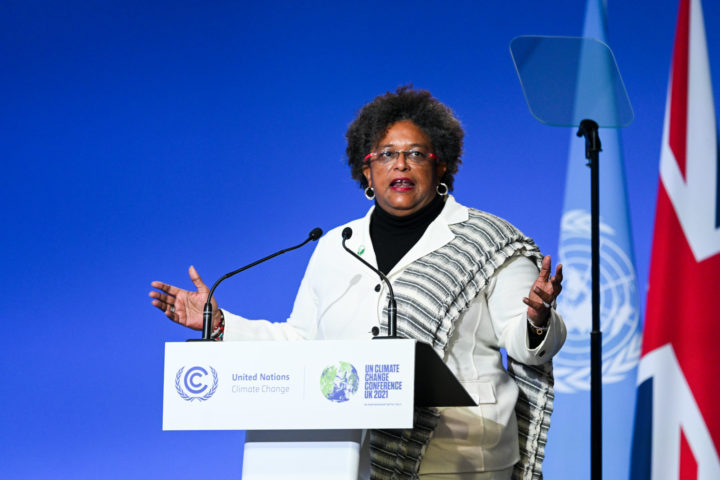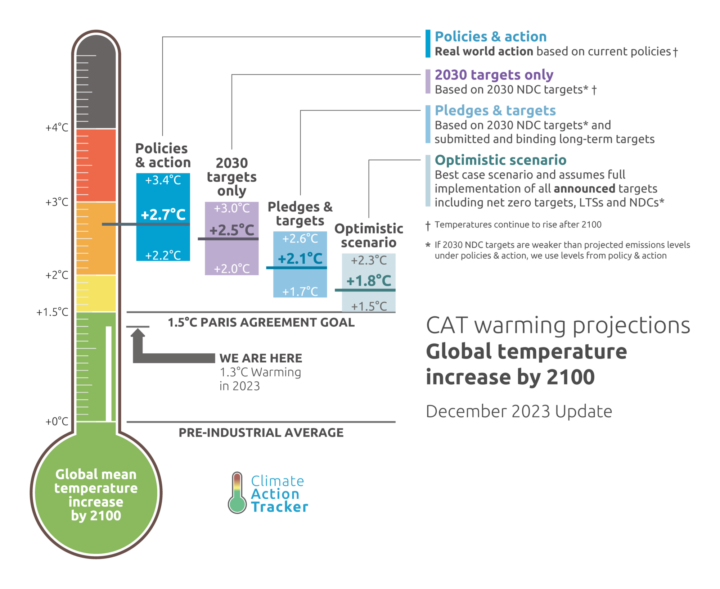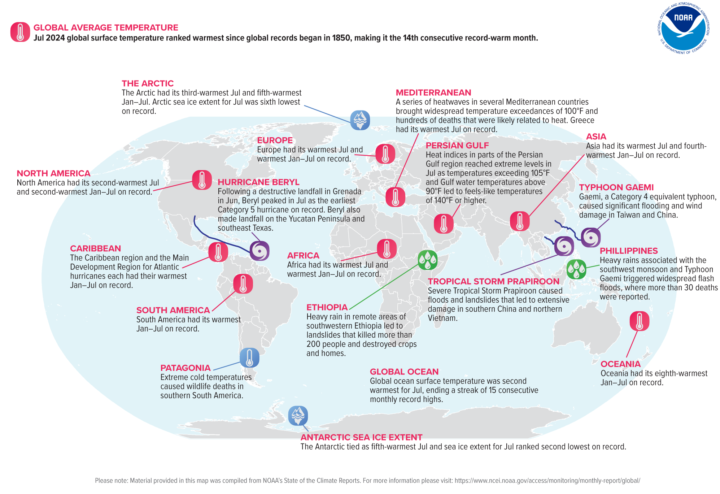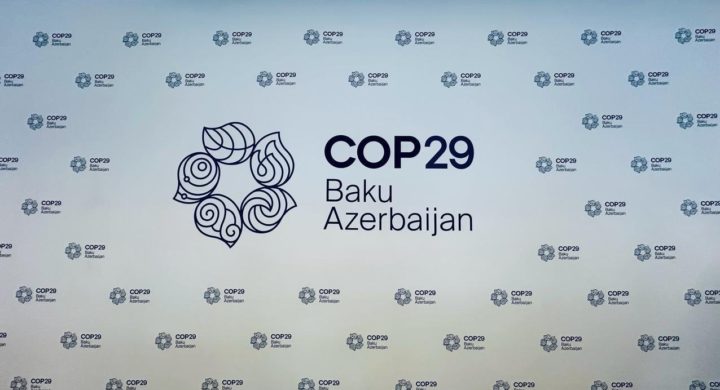COP29 – what to expect…
The next UN climate summit takes place in November, in Azerbaijan. As it draws closer, we take a look at what is on the agenda, and what could influence progress.

By Gareth Redmond-King
@gredmond76Share
Last updated:
Towards the end of a year dominated by wars, elections, and climate extremes, the next UN climate summit, convenes in Baku in November. Azerbaijan takes over the presidency from the United Arab Emirates with, as things stand now, quite a hill to climb.
Focus
Although the Azeris have floated many themes for the summit, including global peace, in reality, attention will be on three areas when it comes to judging whether COP29 has had an impact.
New climate finance goal
Money will be the most important focus of this year’s climate talks. Back in 2009, wealthy nations pledged they would deliver $100bn a year in climate finance, from 2020, to support poorer, developing nations to cut emissions and adapt to climate change. Two years late, they may have delivered on that pledge in 2022 say the OECD; not so much, say Oxfam International, given how much of it was in the form of loans.
Either way, the pledge was locked into the Paris Agreement in 2015, which also built in a ratchet process. That now means a ‘new collective quantified goal’ (NCQG) for climate finance from 2025 onwards is on the agenda at COP29, where delegates must make progress on how the world will turn the billions into trillions. Whilst no solid number has become the focus of negotiations, asks have tended to hover around the trillion dollars mark. Which is not, straightforwardly, a demand that the wealthy governments deliver ten times the original commitment, in public finance. Although the core ask of the largest group of NGOs is that $1 trillion should come principally via public finance from the wealthiest nations – also the biggest historic emitters and still amongst the biggest emitters today – talks will go into sources of finance, as well as sums.

In the mix will be the Bridgetown Initiative, pioneered by Barbados PM, Mia Motley, who has been pushing for reform and innovation in the multi-lateral development banks (MDBs) like the World Bank and International Monetary Fund. The International Experts Group set up under India’s presidency of the G20 has called on them to triple their lending each year by 2030, with more focus on climate and nature.
There is also increasing expectation for the private sector to cough up and invest more, both in clean energy and nature-based tools to cut emissions, and in adaptation solutions to build resilience. Greenpeace are amongst those who have called for a global levy on fossil fuel companies’ massive profits from Russia’s invasion of Ukraine. And the COP29 presidency has announced a new voluntary fund into which oil and gas extracting companies and countries will be asked to pay.
Taxes are up for discussion too. A Global Solidarity Levies Taskforce, convened by France, Barbados and Kenya, has set out a range of new global taxes – on maritime emissions, frequent fliers, fossil fuel extraction, financial transactions, and billionaires – that could be levied to fund climate finance. And Brazil, in its role hosting the G20, has proposed a global tax on the planet’s billionaires that could raise $250 billion a year which could, amongst other things, help fund action on climate change.
All wealthy nations – and we can expect debate as to who should be in that category – will be expected to engage in the coming months, and arrive at COP29 with a new offer. And, in unstable times, many will be mindful of the national, food and energy security issues which climate finance helps them to mitigate.
Beginning of the end of fossil fuels
COP28 included a historic commitment to transition away from fossil fuels. The first formal acknowledgement in COP outcomes that use of coal, oil and gas has to end, it was hailed as the beginning of the end of the fossil fuel era’.
However, there is very little sign of movement on this. Negotiations in Bonn on how it should even be discussed at COP were slowed by the Like-Minded Developing Countries group, which includes Saudi Arabia, China, and COP27 hosts, Egypt. COP29 hosts, Azerbaijan, have made little reference to it, beyond reiterating the commitment itself. Failure to build on it and achieve progress on what it means for parties in raising their ambition in new pledges, would be seen as a setback for the COP process.

New pledges
COP30, to be hosted by Brazil in 2025, is the point by which parties to the Paris Agreement must submit those new nationally determined contributions (NDCs). That means offering up higher targets for cutting emissions through this decade, and into the next, alongside commitments on adaptation. Leadership will be important, and there is expectation that the COP hosts ‘troika’ – UAE, Azerbaijan, and Brazil – will present enhanced NDCs by COP29. But who knows when other nations follow suit to build momentum. Certainly, attendees at the summit will hope to hear positive noises from the big emitters – US, EU and China – about early new pledges for 2025. And with the new UK government having promised to step back into a climate leadership role, everyone will be listening out for their plans on new targets. Certainly, before their first month is up, new Energy Security and Net Zero Secretary Ed Miliband has already sought formal advice from the Climate Change Committee on what the UK’s NDC should look like.
Context
No COP meets in a vacuum and COP29 will take place at the end of another year of climate extremes and broken records, and towards the end of a run of some 70 elections around the world, covering half the world’s population. That includes the UK, Azerbaijan itself and, just days before the summit, the United States.
Worsening climate impacts
We are likely to know, by COP, whether 2024 is the latest hottest year on record – beating 2023. Certainly, it has been a year of ever more dangerous climate impacts. 13 monthly heat records in a row says the EU’s Copernicus climate change monitoring, or 14 according to NOAA, the US monitoring body, which ranks July 2024 as another ‘hottest ever’. Continued high ocean temperatures and low sea ice cover; two new highest average global temperatures within two days of one another; and a succession of devastating floods, fires, and storms, on top of the record-breaking heatwaves. Here at home, we saw the wettest winter on record, with the Met Office showing our climate is getting warmer and wetter, faster. All of which is costing lives and livelihoods, as well as jeopardising food security at home and abroad. It has become commonplace to refer to each new extreme, and every new study or report, as the latest warning for the world. But by the time we get to COP29, leaders will meet amidst a cacophony of alarms that might reasonably be expected to inject urgency into talks.

Reviving UK leadership
The UK election replaced a Conservative government of 14 years, which had been rowing back on some of its climate commitments over the previous year, with a new Labour government elected with a mandate for greater ambition on climate. New Prime Minister, Keir Starmer, and Foreign Secretary, David Lammy, have said they want to reset the UK’s relationships globally in three key areas – Europe, the Global South, and on climate change, where Ed Miliband, has said the new government intends to lead again on the world stage. This should bode well for the UK’s engagement at COP29, although parties – particularly those from developing nations in the Global South – will expect words to be matched with the imminent arrival of a higher ambition UK NDC in the near future, and a new offer on greater contributions to climate finance beyond 2025.
Space for civil society
The last two COPs have been hosted by nations with authoritarian regimes which severely restrict civil society; demonstrations could only take place inside the COP venue, under UN auspices. Although Azerbaijan held an election this year, its President, Ilham Aliyev, was elected with 92% of the vote. Human rights organisations report severe restrictions on freedoms of expression, assembly and association, corruption and systematic targeting of opposition and media. Once again, climate NGOs and other observers from around the world will gather in a country with little or no freedom for NGOs to operate, far less make demands on their government. Whilst that does not, in and of itself, prevent progress at COPs, it is not exactly conducive to it.
The United States
Eight years ago, COP22 was overshadowed by Donald Trump’s election as US President, who went on to declare he would pull his country out of the Paris Agreement. That never formally took effect, as Joe Biden reversed the decision. However, on 5th November this year, Trump is back on the ballot and could get a second term. Given his associations with fossil fuel interests, declared view that climate change is a hoax, and plans for dismantling environmental organisations and protections in Project 2025, widely believed to be his plan for governing, a Trump win would cast a pall over proceedings in Baku. Whether he would actually be able to dismantle Biden’s Inflation Reduction Act (lots of funding from which flows to Republican states) and slow market momentum towards clean technology in the US would remain to be seen. But certainly the US would once again exit the world stage on climate, leaving significantly less pressure on others to up their game, as well as hobbling further US contributions to climate finance. A Kamala Harris win, on the other hand, could be quite the boost to progress at COP29.

Share